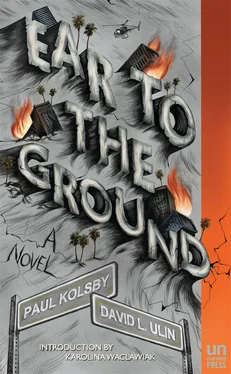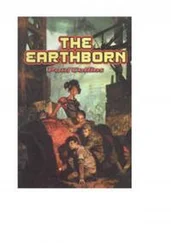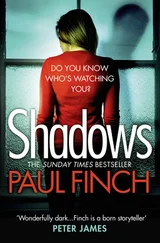Charlie liked to think of himself as the one person in Los Angeles who couldn’t have cared less. He had not watched the trial on television, nor read the stories about Marcia Clark’s hairdo. He didn’t give a damn about Lance Ito’s hourglasses, and he wouldn’t have recognized Mark Fuhrman if the detective had waved a blood-stained glove in his face.
He’d met Simpson as a kid, when Charlie’s grandfather had taken him to see the Heisman Trophy winner play at USC. After the game, they’d been escorted into the locker room, and O. J. had signed young Charlie’s program: “O. J. Simpson, number 32.” There had been something flat and distant in O. J.’s eyes — shark’s eyes, rolling over from gray to black. Charlie had gone home and put that program in the back of his closet. Years later, he finally threw it away.
Now, from what little Charlie knew or cared, O. J. Simpson had killed his ex-wife and also the man who’d seen him do it. He had left his own blood at the crime scene and had carried the blood of his victims back to his home. What could be more scientific or empirical than that?
Still, Charlie felt a twinge of curiosity, as if his indifference had somehow unraveled and worked its way inside him like a tangle of worms. He tried to focus on the screen, but soon he pushed away from his work station and went over to where the technicians still clustered and conjectured around the TV.
“Hey, Charlie. You want a piece of this?”
Charlie pulled out a bill. “Guilty,” he said. “On both counts.”
Tuesday morning, for the first time in a long time, there were no reporters waiting on the sidewalk in front of Charlie’s apartment. Navaro sat in the early mist smoking a Pall Mall on the steps, and he gave a small laugh as Charlie came outside.
“Look at you,” said the landlord, sweeping his arm across the empty lawn. “Yesterday’s news.”
“Yeah,” Charlie said, stopping at the bottom of the stoop. “Too bad they won’t stay away.”
Navaro took a long drag off his cigarette and exhaled a ghostlike spray of smoke into the air. “He’s gonna walk. You know that?”
“I don’t think so.”
“Ever heard of ‘reasonable doubt’?”
Was there nothing else to talk about? Charlie wondered. Nothing at all?
“Four hours ,” Navaro continued. “You don’t condemn a man in four hours.”
“Maybe you’re right.” Charlie started walking.
“Eight million of my tax dollars, pissed away …”
“Yeah, well …”
“Justice!” Navaro spat on the pavement. “No such thing as justice with these lawyers running wild. That Johnnie Cochran’s got everybody so worried about a riot they forget two people got their throats cut!” The angry old man’s voice got low. “All you need is money in this world. Y’got money, you can kill whoever you want.”
At nine-fifty on the morning of October 3, the city of Los Angeles drew a sharp collective breath of anticipation, then grew silent as a tomb. Television sets emerged from office desk drawers, and workers gathered before them with the reverence of the faithful. In bedrooms and living rooms and kitchens they watched, as the honorable Judge Ito welcomed the jury into the courtroom for the last time, and O. J.’s granite jaw quivered and was still. They watched while they drove the freeways, or sat down in restaurants, and on the sidewalks; they saw the images multiplied in the windows of appliance stores. They watched and they waited, until the bailiff stumbled: “In the matter of the people versus Oren … Orenthal James Simpson …”
Afterward, Charlie looked around at his colleagues. He saw the elation of some and the dismay of others. To his surprise, he found that he felt sick — and not because he’d lost five dollars. No, in the absence of another suspect, it was as if the killings had never taken place.
Later, Charlie would consider the verdict to have caused its own kind of earthquake, ripping through the soul of the city with a palpable seismic force. And for a few days afterward, as jurors made appearances on daytime talk shows, it became clear that this trial had shaken a divided nation. How ironic, Charlie thought, that in eighty-seven days, quite something else would shake and divide the ground beneath their feet.
GRACE GONGLEWSKI SPENT EARLY OCTOBER IN THE conference room at Tailspin Pictures, playing host to producers and associate producers and assistant producers and line producers and co-executive producers, production managers and post-production supervisors, explosives experts and special effects designers, directors of photography and camera assistants and assistant camera assistants, location scouts, location coordinators, and George Lucas.
Top brass at Warner Brothers popped in twice a day to say hello and give their full support to the most ambitious project in the studio’s history: A feature film from script to theaters in seventy days. Less than three weeks into pre-production, not including core salaries, two million dollars had been spent on Ear to the Ground, primarily, it seemed, on doughnuts, coffee, and Wolfgang Puck gourmet pizzas.
Five separate first-units would film simultaneously, and a helicopter would shuttle the director and actors among them. Six hundred crew members and six thousand extras would be employed. A tidal wave would be enacted, freeways collapsed, and — at last count — eight high-rises would be swallowed whole. Three thousand walkie-talkies were to be rented, along with three hundred on-road and off-road vehicles. And three million feet of film would be exposed. Editing would begin the minute film was shot. Six months of work would be collapsed into one, at a cost of a hundred million dollars. And rising.
When Grace’s alarm went off at six-fifteen on Friday morning, her eyes and lids had fused, and it took a combination of Visine, saline, and water to separate them. Once upon a time, she had looked forward to Fridays, but the bleary-eyed reality was that she wouldn’t have a day off until the new year.
Casting began today, and Grace hated nothing more than seeing three hundred people deliver the same stupid lines differently, over and over. She hated casting directors, especially the parties they threw, where empty-headed beauties were just waiting to get your card so they could call you at the office. Actors were nightmares, not to be trusted. Their talent was to be whoever you wanted them to be. In that regard, she thought, they were nothing.
There were a hundred pretty actresses gathered outside a soundstage near the Burton Way gate. The cavernous interior had been divided by screens, which didn’t make the place seem any more intimate. Grace was well into her fourth cup of coffee when Ian walked onto the stage.
“Have you seen Henny this morning?” he asked Grace.
She shook her head.
“Have you talked to him?”
“No.”
Ian’s cell phone rang.
“Hello?” he said.
Grace tried not to watch him, but she couldn’t help herself. Ian seemed so fulfilled, like a butterfly that had emerged from a cocoon. She tried to remember how he used to be — pale, unkempt, eyes always looking for an angle to play. Now, he seemed possessed of a preternatural calm that radiated from his face and shoulders in exponentially increasing waves. He wasn’t even rattled when Henny Rarlin stalked onto the stage and told him to get off the phone.
“The pages suck ,” Henny bellowed. “You haven’t incorporated one …”
Ian pulled half a dozen sheets of script from an expensive black-leather shoulder bag and handed them to the director. “You must’ve read the old ones,” he announced.
Читать дальше












